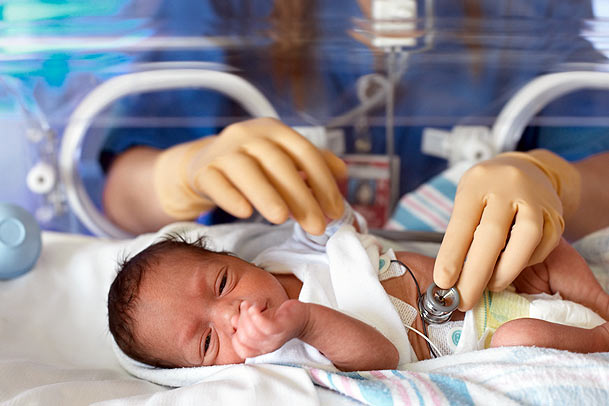What is Neonatal Intensive Care (NICU)?
Neonatal Intensive Care (NICU) is a specialized unit in hospitals designed to provide intensive care and monitoring for newborns who are premature, critically ill, or have birth defects. It is equipped with state-of-the-art medical equipment, and skilled neonatologists and pediatric nurses provide round-the-clock care to ensure the survival and well-being of newborns facing life-threatening conditions.
When is Neonatal Intensive Care (NICU) Needed?
- Premature Birth: Babies born before 37 weeks of gestation may require NICU care due to underdeveloped organs.
- Respiratory Distress: Newborns with breathing problems need intensive monitoring and support.
- Infections: Babies born with or who develop infections shortly after birth need specialized medical attention.
- Birth Defects: Some newborns with congenital conditions need critical care for immediate interventions.
- Low Birth Weight: Babies weighing less than 2.5 kg may face difficulty regulating body temperature, feeding, and other vital functions.
- Jaundice: Severe jaundice may require phototherapy or other treatments within a NICU setting.
Why Choose India for Neonatal Intensive Care?
India is home to some of the best NICUs globally, offering affordable, world-class care for premature and critically ill newborns. Hospitals in India are equipped with the latest technology and staffed by experienced neonatologists and pediatric specialists, ensuring the highest level of care for newborns in need.
Key Advantages of Choosing India for NICU Care:
Symptoms Indicating the Need for NICU Care
Newborns may require NICU care if they exhibit certain symptoms that indicate they are at risk of complications. Common symptoms include:
- Breathing Problems: Difficulty in breathing, irregular breathing patterns, or a bluish tint to the skin (cyanosis).
- Low or High Body Temperature: Babies who cannot regulate their body temperature, showing signs of being too cold or too hot.
- Poor Feeding or Weak Sucking Reflex: Difficulty feeding, poor sucking reflex, or lack of interest in feeding.
- Jaundice: Yellowing of the skin or eyes, which may require phototherapy in the NICU.
- Abnormal Heart Rate or Blood Pressure: Irregularities in heart rate or low/high blood pressure levels.
- Severe Prematurity: Babies born prematurely, before 37 weeks of gestation, who may need specialized monitoring and care.
- Infections: Signs of infections such as fever, lethargy, or abnormal breathing patterns.
- Abnormal Muscle Tone: Poor muscle tone (floppiness) or unusual rigidity, indicating neurological concerns.
- Excessive Vomiting: Persistent vomiting, which could signal feeding difficulties or underlying health issues.
- Severe Dehydration: Dry mouth, sunken eyes, and lack of urine output may indicate dehydration requiring intensive care.
Common Conditions Treated in NICU
Neonatal intensive care is required for various conditions, including:
- Prematurity: Babies born before 37 weeks, who may have underdeveloped organs.
- Respiratory Issues: Conditions like respiratory distress syndrome or apnea.
- Infections: Sepsis, pneumonia, and other neonatal infections.
- Low Birth Weight: Babies who weigh less than 2.5 kg at birth may require specialized care.
- Congenital Conditions: Birth defects affecting organs or systems, such as heart defects or gastrointestinal malformations.
- Jaundice: Severe cases of jaundice requiring phototherapy or medical intervention.
NICU Procedures and Treatment
NICU care involves a range of procedures to stabilize and treat newborns, depending on their condition. Some common procedures include:
- Incubation: Premature babies or those with respiratory distress may require an incubator to regulate body temperature.
- Ventilation Support: Mechanical ventilation may be used for babies with breathing difficulties.
- Phototherapy for Jaundice: Babies with severe jaundice may undergo phototherapy to reduce bilirubin levels.
- Feeding Support: Babies unable to feed on their own may receive nutrition via IV fluids, nasogastric tubes, or special feeding methods.
- Monitoring: Continuous monitoring of vital signs such as heart rate, oxygen levels, and blood pressure.
Benefits of NICU Care
The NICU provides vital support to premature or critically ill newborns. The benefits include:
- Improved Survival Rates: Specialized care significantly increases the chances of survival for premature or critically ill newborns.
- Comprehensive Monitoring: Round-the-clock monitoring ensures that early signs of complications are detected and managed promptly.
- Advanced Medical Care: Access to the latest technologies and treatment protocols for managing neonatal conditions.
- Reduced Long-Term Complications: Early intervention can prevent long-term developmental issues caused by prematurity or illnesses at birth.
Post-NICU Care and Recovery
Once a baby is stable, the NICU care transitions into post-discharge care, which includes:
- Feeding Support: Continued monitoring to ensure proper growth and development through feeding.
- Follow-Up Appointments: Regular check-ups with neonatologists and pediatric specialists to monitor the baby's progress.
- Developmental Milestones: Close observation to ensure that the baby meets developmental milestones.
- Vaccinations: Ensuring that newborns receive their necessary vaccinations in time.
Cost of Neonatal Intensive Care (NICU) in India
The cost of neonatal intensive care in India is significantly more affordable compared to Western countries. The price for NICU services in India typically ranges from INR 30,000 to INR 1,50,000 (approximately USD 400 to USD 1,800) per day, depending on the baby's condition and required treatments.
Key Factors Influencing the Cost:
- Type of Treatment: The complexity of the condition, such as respiratory support, surgery, or long-term care, can affect the cost.
- Hospital and Location: Hospitals in metro cities may charge more due to higher operational costs, while smaller cities offer more budget-friendly options.
- Length of Stay: Longer stays in NICU will increase the overall cost.
- Type of Care: Advanced care options, such as specialized treatments or surgeries, may increase the cost.
India offers top-notch NICU services at a fraction of the cost found in developed countries, making it an excellent choice for medical tourism.
Frequently Asked Questions (FAQs)
- What is NICU care?
NICU care provides specialized medical attention to newborns who are premature, critically ill, or have birth defects, ensuring they receive the best chance for survival and health.
- Why do babies need NICU care?
Newborns may require NICU care due to prematurity, respiratory problems, infections, birth defects, or other conditions that affect their survival or development.
- How long will my baby stay in NICU?
The duration of NICU care depends on the baby’s condition. Some babies may stay for a few days, while others may need weeks or even months of care.
- Can I visit my baby in the NICU?
Yes, most hospitals allow parents to visit their babies, but visitation times and rules may vary depending on the NICU's policies and the baby’s condition.
- Is NICU care available in all hospitals?
Not all hospitals have NICUs. It is essential to choose a hospital with a dedicated NICU unit that is equipped with specialized equipment and staff for neonatal care.
- How can I prepare for a NICU stay?
It’s essential to stay informed about the NICU process, ask questions about your baby’s care, and ensure you have emotional and logistical support for the duration of your stay.
- What happens if my baby is discharged from NICU?
Once discharged, your baby will need regular follow-ups with doctors to monitor growth and development, and may require continued medical support depending on their condition.
- How much does NICU care cost in India?
The cost for NICU care in India generally ranges from INR 30,000 to INR 1,50,000 per day, depending on the condition of the baby and the required treatments.
- What are the risks of NICU care?
While NICU care is critical for survival, risks include potential infections, complications from treatments, or long-term developmental issues for extremely premature babies.
- Is NICU care available in all regions of India?
Yes, India has specialized NICU facilities in both metro and smaller cities, although the level of care and costs may vary by location.




